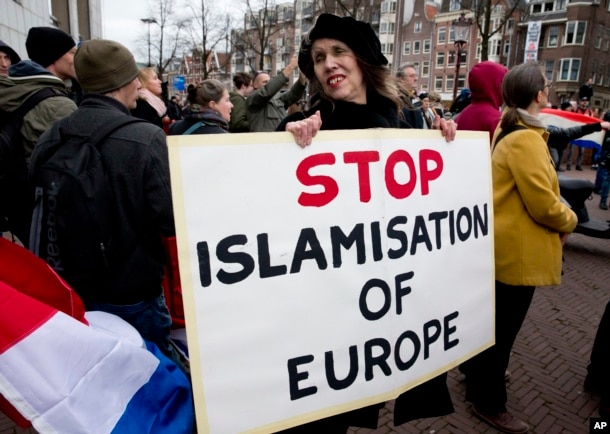
Jihadist Terror, Refugee Issue Likely to Shape Upcoming Europe Polls
Jamie Dettmeram
VOA News
ROME — Just as Islamic State is pushed on its back-foot in Syria and Iraq, the jihadist terror threat is set to become a key factor in a series of national and regional elections across Europe.
Some fear that in a feverish pre-election atmosphere in Austria, France, Germany and the Netherlands politicians chasing populist votes risk assisting, if inadvertently, jihadist propagandists and recruiters by depicting Islam as a menace to national identity.
Across Europe there is a resurgence of identity politics as fears mount over Islam and terrorism and debates sharpen about what balance should be struck between security and liberty.
On Sunday, the right-wing nationalist Alternative for Germany, an anti-immigrant party founded just three years ago, made huge gains in a regional election, a year after German Chancellor Angela Merkel’s decision to open the country’s borders to refugees. AfD pushed Merkel’s conservative Christian Democrats into third place in the chancellor’s home state.
Some question whether the AfD can repeat its performance in subsequent regional elections during the next 12 months culminating in a national poll.
“We must see if in the coming months the debate on refugees is still the number one issue, or socio-economic issues,” according to Jean-Michel De Waele, a political scientist at the Free University of Brussels.
Future of European politics?
The AfD’s surge Sunday has jolted Europe, serving notice that populist, anti-immigrant advances are likely to be seen in upcoming elections, forcing more centrist parties and politicians to adopt tougher security policies and harsher anti-immigrant rhetoric to fend off the challenge.

FILE – A woman holds a placard at a rally calling against immigration and what demonstrators see as the Islamization of their communities, in Amsterdam, Netherlands, Feb. 6, 2016.
That in turn will reshape European politics and likely the negotiations between the European Union and Britain, which voted in July to leave the economic bloc. It could also impact relations between the West and Russia, which has been courting, and possibly funding, some far-right European parties.
But the far-right rise in Europe could have the most immediate impact on relations between Muslims and non-Muslims. The tone for France’s election season appears to have been set by the summer-long political controversy over the attempt by dozens of mayors of seaside towns to ban the “burkini,” a cross between a burqa and a swimsuit.
Nicolas Sarkozy, a former president vying to secure the nomination of the conservative Republican party, backed the burkini ban. So too has Marine Le Pen, leader of the far-right National Front. She claims that the very “soul of France” is at stake.
As identity politics frames the upcoming European elections, some analysts and officials fear contests will become perceived by the continent’s Muslims as competitions about who can bait them the most, alienating Islamic communities and adding to the disaffection of their young.
War of religions sought
Counterterror analysts have warned the jihadist strategy aimed at provoking an overreaction by Western governments and enraging citizens will be furthered by the electoral depiction of Islam as the enemy and the mixing of immigration and terror policies.
Among them, American anthropologist Scott Atran, who has long warned jihadists are, “… seeking to provoke deeper divisions between Muslims and non-Muslims in Europe, forcing the latter to overreact as the terror becomes ever wilder and more extreme, thereby leaving the former with no choice but to join the jihadist camp.”
In August, IS’s online magazine Dabiq focused on the theme of “Break the Cross.” In a series of interviews, foreign fighters who had converted from Christianity were used as mouthpieces to urge supporters in the West to destroy “arrogant Christian disbelievers.” They exhorted Muslims to “pray for Allah’s curse to be upon the liars.”
The IS aim, observers believe, is to exacerbate antagonism toward Muslims in Europe and provoke a «war of religions,» the logic being – the more outrageous the targets, the more likely the terror will provoke overreaction and fuel the rise of populist nationalist sentiments and parties.
That appears to be working. A Pew research survey released in July uncovered suspicions among non-Muslim Europeans that a large portion of their Muslim neighbors harbor sympathy for the jihadists.
Even in countries considered more tolerant – Germany, the Netherlands, Britain and Sweden – fewer than half of respondents believed “very few” Muslims supported IS.
Looming large
“Attitudes toward Muslims and refugees loom large in the European political debate, and this is reflected in current public opinion. Majorities in Greece, Hungary, Italy and Poland express negative attitudes toward both Muslims and refugees,” the Pew survey authors wrote.
Italian career diplomat and European Union envoy Sem Fabrizi noted recently it is hardly surprising there is a considerable debate over the link between terrorism and migration given the refugee crisis is connected with the conflict in Syria and the threat posed by Islamic State. But he urges caution in conflating migration and counter-terror policies. “We must take care to avoid jumping to simplistic conclusions about how terrorists are motivated and enabled or to criminalize migrants or refugees,” he argues.
That isn’t a prescription being followed in Austria by the right-wing Freedom Party’s Norbert Hofer, who has been mixing security concerns with anti-immigrant messages. Pollsters are predicting a win for Hofer in the October 2 presidential election, a re-run of a poll in May that was annulled by the courts.

